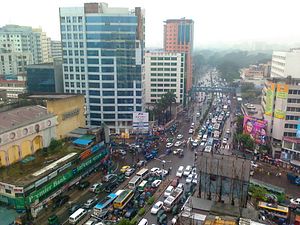Bangladesh’s main opposition party and several otherwise well-intentioned human rights groups have accused the government of kidnapping hundreds – and possibly thousands – of citizens for nefarious reasons, mostly political. The claim is false and reckless. (Editor’s note: For an overview of the human rights groups’ criticisms, see here.)
The truth is the government is investigating the so-called disappearances – every one of them. Several have turned out to be ruses staged by individuals who were trying to evade the law because charges were pending against them. In general, however, the accusation is obviously exaggerated; no one, not even the government, can hide several hundred people in a country as densely populated as Bangladesh.
The Bangladesh police have investigated every instance of a reported disappearance. They have not uncovered any evidence that suggests the government is behind them. Rather, the police have located many of the “disappeared” in hiding. They were wanted by Bangladeshi authorities for violent felonies, including the rampant fire bombings around the time of the last national election.
Bangladeshis have suffered too much violence in recent years, ranging from the overturning of railway cars to the burning of buses. Many of the incidents, sadly, were conducted by members of the Bangladesh Nationalist Party (BNP), which opposes the government. In other words, many of the “disappeared” are leaders of the opposition who are accusing the government of kidnapping them while they are, in fact, trying to avoid arrest by disappearing. Ironic – and sad.
No one in Bangladesh is surprised by the BNP’s willingness to spread such false rumors. For the BNP though, it is a dramatic change in strategy. No longer much of an electoral threat, they now play the victim.
The BNP boycotted the 2014 elections. Instead of contesting for seats in the parliament, it instigated nationwide strikes and other disruptions. They bombed polling booths. Armed with Molotov cocktails and gasoline bombs, BNP-backed attacks killed 231 people and injured 1,180 others. The government deployed troops to stop the violence and arrested the ringleaders. The BNP’s popularity dropped to an all-time low while the ruling Awami League continued to lead Bangladesh along a secular, democratic path.
Some of the “disappearances” are almost comical. Take the case of Salahuddin Ahmed, who was reportedly abducted by Bangladesh police in 2015. He was found two months after he was reported missing, hiding in India where the police quickly concluded that he concocted the entire episode in an attempt to avoid trial in Bangladesh.
Another noteworthy example involves the case of Syed Sadat Ahmed, who was wanted by Bangladesh police in connection to an arson attack. Ahmed was reported missing in August 2017, but was miraculously found, unharmed, in December in Dhaka’s Shahjadpur district. BNP-linked intellectual Farhad Mazhar was found just hours after he was reported missing, travelling on a bus to the capital from the southwestern city of Khulna.
Bangladesh police deserve credit for their diligent approach to this complex issue. They have been quick to act on reported disappearances and have done a remarkable job tracking down the people who have vanished.
The police have conducted themselves in accord with both domestic and international laws. Bangladesh is a signatory to the 1984 United Nations Convention Against Torture, and Cruel, Inhuman or Degrading Treatment or Punishment. Bangladesh also has anti-cruelty laws and constitutional prohibitions.
In addition, police and law enforcement authorities in Bangladesh are heavily regulated and scrutinized. There’s simply no way for them to be randomly kidnapping opposition politicians in broad daylight and get away with it.
This is not to say that Bangladesh has never dealt with enforced disappearances before. Successive military juntas and caretaker governments used the tactic, so it’s familiar to Bangladeshis as a possibility. But history isn’t repeating itself. The BNP’s deceptions might have the ring of truth. But they are false and cynical. The world should reject the fairy tale of Bangladesh disappearances as the lie that it is.
Sajeeb Wazed is the information technology adviser to the government of Bangladesh and the son of the prime minister.































